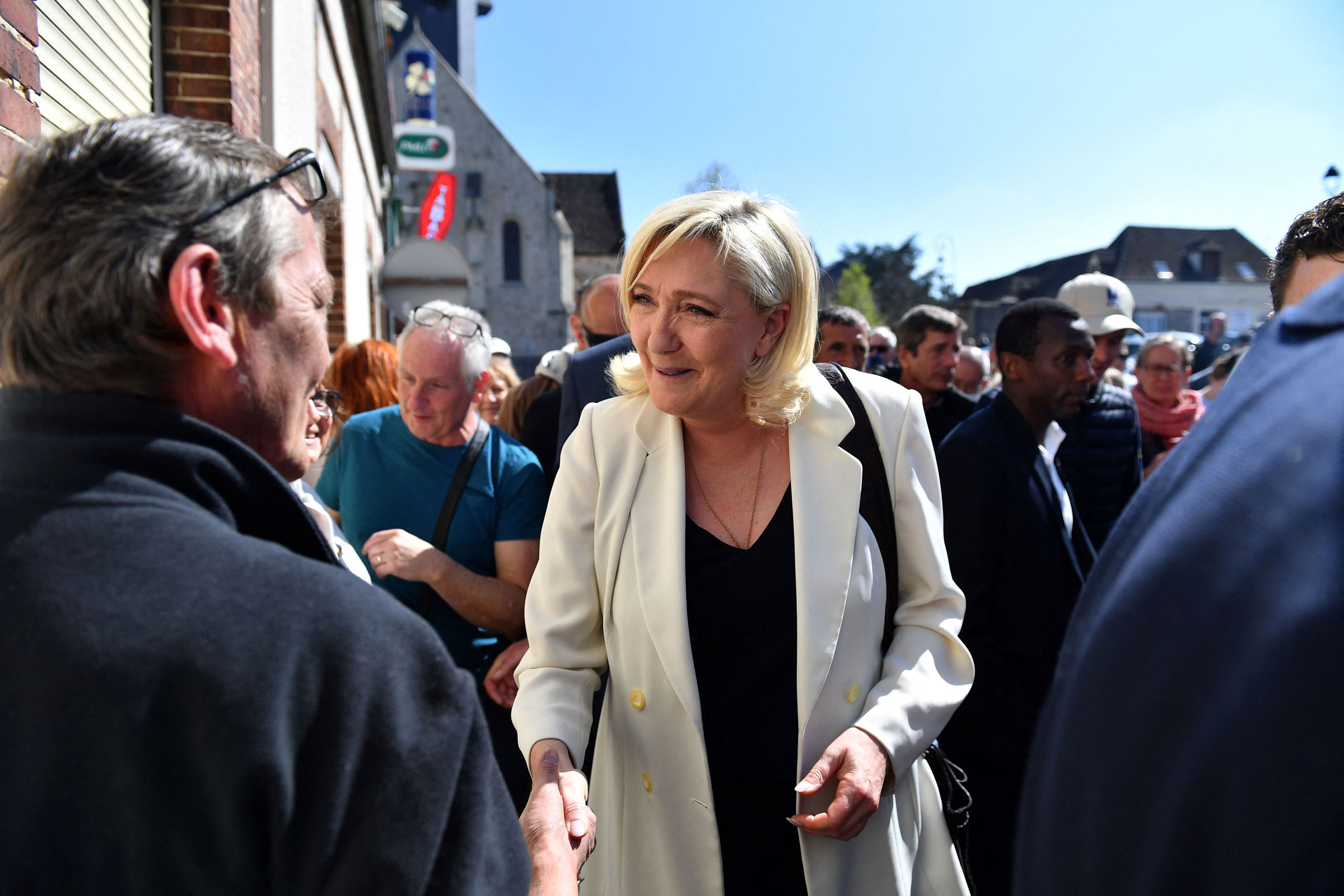
The door of the small white house opens slightly at the sound of knocking, and then is flung wide open. Jean-Luc Henault, a 65-year-old pensioner smiles broadly at the election campaigner on his doorstep, who is clutching leaflets for France’s far-right presidential candidate Marine Le Pen. “I am definitely voting for Marine,” he says, speaking on April 13—just a few days after Le Pen and centrist President Emmanuel Macron made it to the second round of the presidential elections. “Macron promised to change France, but that has not happened in five years.”
In Beaucamps-le-Vieux, a one-time industrial hub three hours north of Paris, Henault is not alone in his disappointment with Macron. Le Pen, a hardline anti-immigrant nationalist, swept the first-round of elections on April 10 in this tiny village, where just 786 people voted. Le Pen won twice as many votes as Macron, and four times as many as Henault’s once-favored politician, far-left candidate Jean-Luc Mélenchon. Like many others, Henault has shifted his loyalties from far-left to far-right, bypassing the traditional socialists and republicans.
On April 24, when Macron and Le Pen compete in a run-off vote to be French president for the next five years, this tiny community will not make much of a dent in a country of 67 million people. Yet even so, it is the deep challenges in communities much like this one—declining public services, and limited job prospects—that could help determine whose vision of France finally prevails.
Polls suggest Macron will win another five years in the Elysée Palace in Sunday’s race, with about an eight-point lead over Le Pen. But the gap between the two has been razor-thin at times over the past few weeks. And it’s much smaller than the 32-point margin Macron had over Le Pen in 2017, underscoring the exceedingly high stakes in this election not only for France, but for Europe and the U.S. too.
After becoming the youngest-ever French president five years ago, Macron, 44, a former investment banker, has pushed for a more forceful E.U. globally, with a bigger military power; he even ends his election rallies with the E.U. anthem, Beethoven’s “Ode to Joy.” He has streamlined France’s labyrinthine labor laws, making it much easier to hire and fire staff, and to launch innovative businesses, in what he deems the “start-up nation.” He also says he intends to raise the public-pension age from 62, perhaps to 65.
Read More: Emmanuel Macron Is on Track to Win Re-Election. What Comes After Could Be Tougher
Le Pen, 53, is running on a very different platform, promising to drastically cut sales tax on oil, gas, and electricity, scrap income tax for many young French workers, and raise the minimum wage by 10%. She is also vowing to defy the E.U.’s core rules, by giving French citizens preference for jobs, housing, and welfare benefits; imposing border controls around France; drastically cutting immigration; and blocking Muslim practices like wearing headscarves in public, and traditional Halal meat slaughtering. (Macron has also cracked down on what he regards as extremist Mulsim preaching, drawing fierce criticism from France’s large Muslim population.) Le Pen also wants to block the E.U.’s Russia sanctions and repair relations with President Vladimir Putin. She suggests that France could even opt to leave the E.U. altogether, an event that could well shatter the bloc, and remake the Western alliance.
To Americans and Europeans, the political battle sounds all too familiar. Like Donald Trump’s presidential victory in 2016, and the successful Brexit referendum that same year, which resulted in the U.K.’s withdrawal from the European Union, the contest feeds on profound economic shifts.
Le Pen, just like Trump and pro-Brexit politicians, has found support among some wealthy voters, perhaps evidenced in her first-round election celebration on April 10, at an upscale party venue, which included abundant gourmet food and customized Champagne bottles labeled “Marine Présidente.”
But across France, Le Pen has tapped into a deep sense of abandonment felt by millions of French citizens, especially the white working-class. With fewer educational qualifications and dependent on factory jobs, these voters feel they have been left badly trailing by globalization and the tech revolution–and see their leaders as uninterested or incapable of reversing their decline. Travel around the once-manufacturing hubs of France, and one can imagine being in parts of the U.S. Midwest or Britain’s Lincolnshire.

Le Pen’s campaign slogan, “give the French back their country and their money,” echoes the nationalism of Trump’s “America first” and the Brexit slogan “take back control”, which helped drive those campaigns to victory. “The parallels are striking,” Stéphane Bussard, journalist for the Swiss newspaper Le Temps and author of a book on Trump, wrote on April 12. “Several economic, social, and political conditions favorable to [Le Pen] strongly resemble those which allowed Donald Trump to be elected to the White House in November, 2016.”
Even without a Le Pen victory on Sunday, those conditions are sure to remain. In some ways, France’s far-right has already won, by becoming a viable force in mainstream politics. Le Pen won just one-third of the votes in 2017, with 10.6 million people choosing her, compared with 20.7 million for Macron. This time, polls predict she could win more than 40%.
Read More: What a Marine Le Pen Victory in France’s Elections Could Mean for the War in Ukraine
Ironically, Macron himself set the scene for France’s drift to the political extremes. The French leader launched his own centrist party in 2016, roughly translated to The Republic on the Move, which has engulfed the mainstream socialist and republican parties that previously ran France for decades. Together, the traditional party leaders polled just 6.53% of votes on April 10, leaving their campaigns on the verge of bankruptcy.
For millions of French, just recovering from the pandemic and facing 4.5% inflation—the highest rate in a generation—Le Pen’s message has hit home. Of the 12 candidates on April 10, Le Pen won more than 8 million votes, 23% of the total—and just 3.7% behind first-place Macron. Together with votes for anti-Muslim pundit Éric Zemmour, nearly one in three French voters cast their support for the extreme right. (Far-left Mélenchon won a further 22%, by promising to curb price increases and expand public benefits.)
When Le Pen last faced off against Macron she led an openly anti-immigrant, rabble-rousing campaign. This time, armed with a relaxed smile, she has been barnstorming across France as a working-class champion, bemoaning people’s economic struggles, and the rising cost of living—which polls say is voters’ top priority. Campaign buttons and posters, and her voters, call her simply “Marine,” handily distancing her from her initial mentor, her father, the rabidly anti-immigrant right-winger and convicted Holocaust denier Jean-Marie Le Pen.
In the village of Beaucamps-le-Vieux, it’s clear why Le Pen has been able to make inroads. The village and its environs were previously a manufacturing center, with factories making metal chairs, as well as a long-time textile industry, until almost all the plants steadily shut or moved their production, some of it to China, beginning in the 1980s; unemployment in the community is about 21%, according to government statistics, more than double the national average.
“I worked from the age of 15, in three different textile factories,” says Henault. A lifelong Communist, Henault backed far-left Mélenchon on April 10, drawn to his platform of expanded welfare. In the run-off election, he believes little separates those left-wing ideas from those of Le Pen, whom he says care about poor people like himself. By contrast, he says, Macron embodies Paris’s disconnected elite. “I have a pension of €1,000 ($1,080) a month,” he says. “It is impossible to make ends meet.”
There are dozens such stories in this part of northwest France, where factory closures have become a regular part of life. “There are two Frances: The rural France, the forgotten France; and Paris,” says Philippe Théveniaud, 60, a retired trade-union official, who has been campaigning for Le Pen in Beaucamps-le-Vieux. “Paris is totally disconnected from the reality beyond it.”
In 2014, hundreds of workers lost their jobs when the U.S. tire company Goodyear shut its factory in Amiens, a nearby city and Macron’s hometown. In the midst of the 2017 election battle between Macron and Le Pen, the U.S. appliance giant Whirlpool decided to shut its clothes dryer factory, also in Amiens, and move production to Poland, where wages and taxes are a fraction of those in France, while still being in the E.U. The move became a major political flashpoint, with Le Pen seizing on it to rage against the E.U.’s borderless labor market. Both she and Macron vowed to save the 290 factory jobs.
Five years on, the sprawling Whirlpool factory sits abandoned—so empty that I was able to walk through its open entrance one afternoon, and up into vacant offices, with leaves and papers scattered about, and no one in sight.
Macron has not been able to stop the factory closures as President—and there is little reason to believe Le Pen would have any more success. In 2018, the Australian plastic-wrapping company Amcor shut its factory near Amiens, laying off 124 workers, and moved production to lower-cost Portugal. And last year, 863 people lost their jobs, when the Japanese tire factory Bridgestone shut its plant 60 miles north of Amiens.

“Many among us feel that these past five years have been catastrophic under Macron,” says Patrice Sinoquet, 59, a former Whirlpool worker who fought unsuccessfully to save the factory. In 2018 and 2019, he joined the yellow-vest movement—a nationwide protest movement centered on economic hardship, which rocked France for months, and severely rattled Macron’s presidency. “Between the inflation and the cost of living, and the retirement age, it is a disaster,” Sinoquet says.
For some in the gilded capital Paris, 95 miles south, that sense of disaster is hard to fathom. On paper, France’s economy is booming, with 7% growth last year, and a 7.4% unemployment rate, the lowest in 13 years.
All that is trumpeted by Macron in his election campaign. But to those facing factory closures and little expansion around them, the boomtime seems unreal, especially among the shrinking population in rural areas, where about 20% of French people now live. “It is something nobody really feels,” says Emmanuel Rivière, head of international polling for Kantar Public in Paris. “There are many stories, true stories of real people, who have lost their jobs.”
That disconnect has fueled the anger against Macron—and turned it deeply personal, as voters accuse him of dismissing their concerns. “This is the first time, thanks to you, that I’m going to vote for Marine Le Pen,” one man shouted at Macron, inches from his face, while the French leader was greeting voters on a crowded street near Strasbourg, during a campaign stop on April 12. “You are Machiavellian, you are a manipulator, you are a liar,” the man cried. Macron was momentarily stunned into silence, before he defended his record and said he would be prepared to debate the issues.
For weeks, Macron has urged voters to block Le Pen’s path to power, warning them that a far-right victory would spell disaster for Europe, and threaten France’s standing in the world. “Don’t heckle them, beat them on April 24!” he told an election rally on April 16, standing in the dazzling sun in the port district of Marseille. Similarly, the far-left leader Mélenchon, in his concession speech after the first-round election, implored his seven million voters to “not give a single vote to the extreme right,” in the run-off on April 24.
The pollster Rivière says those pleas to stop Le Pen are having some effect, as she appears unable to overtake Macron. The shortfall, he believes, is due to a deep-rooted suspicion of far-right extremism among many French. “If Marine Le Pen was not still the representative of the extreme right, there would be no doubt about her election,” he says.
Yet it is unclear whether millions of voters might choose to simply stay away from the polls next Sunday, rather than vote for Macron.
After the April 10 vote, students at Paris’s Sciences Po and Sorbonne universities staged sit-ins and protests over the lack of left-wing candidates left in the race. And there is also anger among conservatives, some of whom say they will not vote for Macron. “I’ve fought against Emmanuel Macron’s politics his whole term,” says Stéphane Le Rudulier, a local representative in the South of France for the traditional mainstream center-right Republicans party, which won just 4.8% in the April 10 vote. He says he will abstain from voting on Sunday. “I can’t see myself falling into his arms now.”
And up north in Beaucamps-le-Vieux, the former textile worker Henault has rejected the call from his hero, the far-left Mélenchon, to block Le Pen. “He does not control my vote,” he says, explaining why he will vote for Le Pen. “And it cannot be worse.”
More Must-Reads from TIME
- Cybersecurity Experts Are Sounding the Alarm on DOGE
- Meet the 2025 Women of the Year
- The Harsh Truth About Disability Inclusion
- Why Do More Young Adults Have Cancer?
- Colman Domingo Leads With Radical Love
- How to Get Better at Doing Things Alone
- Michelle Zauner Stares Down the Darkness
Contact us at letters@time.com